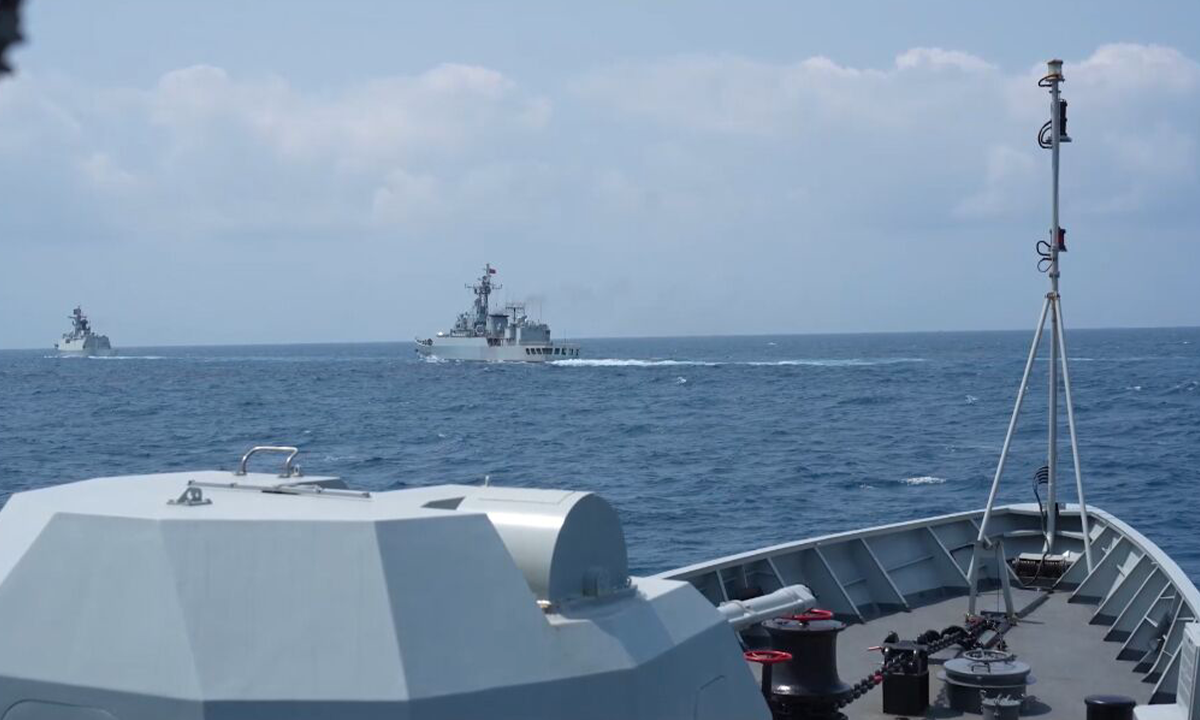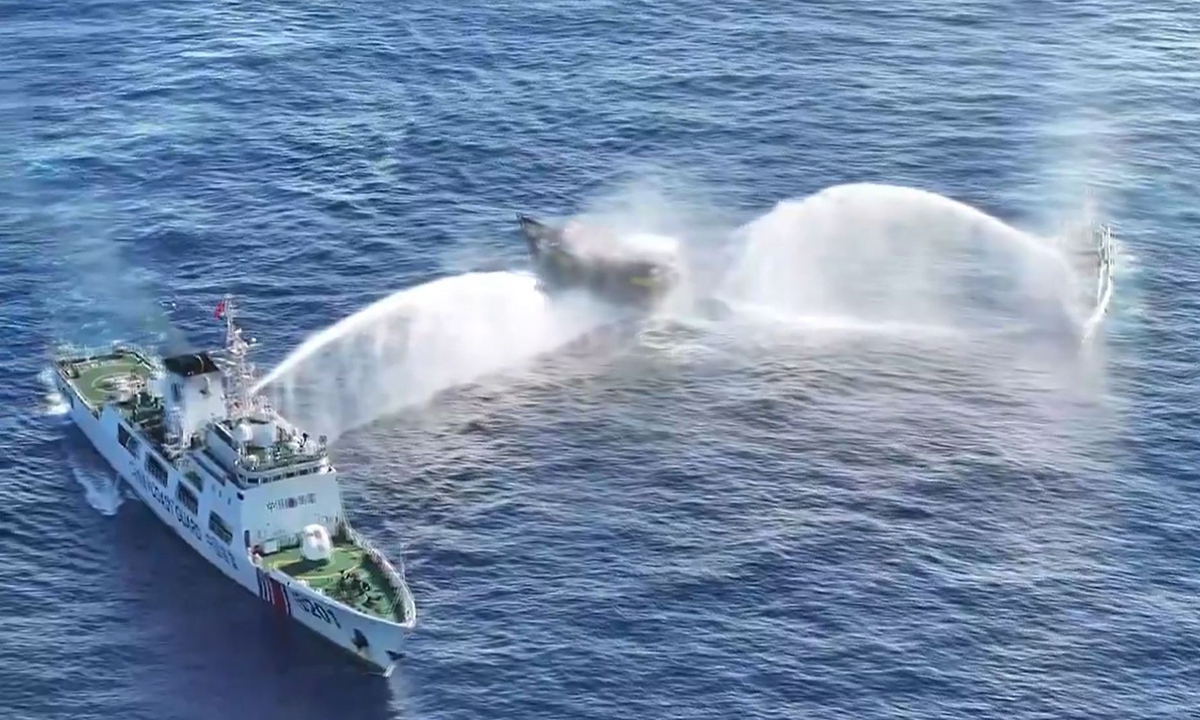
A Chinese navy flotilla of the Southern Theater Command of the People's Liberation Army carry out multi-course real combat training in South China Sea, according to the Command on March 30, 2024. Photo: Wechat account of Southern Theater Command
The situation in the South China Sea has further intensified due to the provocative actions of the US and its allies, Chinese analysts said over reports that Japan is slated to send its Maritime Self-Defense Force to conduct its first joint naval patrols with the US and the Philippines in the region later this year.
Chinese analysts warned that the trilateral exercises in the South China Sea, evidently designed and pushed by the US, only serve to incite greater crisis and conflicts in the western Pacific to help the US compete with China, secure the US leadership among its allies, and profit from the chaos just as it did in the Europe.
Citing US officials and other sources familiar with the matter, US news portal Politico reported on Friday that the US, Japan and the Philippines are slated to launch joint naval patrols in the South China Sea, while suggesting that the leaders of the three countries are expected to reach an agreement on the joint patrols at a trilateral summit in Washington on April 11.
Politico called the potential three-country maneuver "the most robust assertion" of the Biden administration's so-called Indo-Pacific Strategy hinged to rallying allies and partners to offset China's growing economic, diplomatic and military footprint in the region, while warning that such move would likely elicit a strong response from Beijing.
"Japan's decision to join the maneuver is a typical example of the US attempting to recruit more allies in a highly sensitive and conflict-prone area, in order to consume allies' resources and weaken China," Li Haidong, a professor at the China Foreign Affairs University, told the Global Times on Sunday.
Li also warned that US allies and partners including Japan and the Philippines should be aware that the US never heeds the demands of its allies, but rather to exploit the frictions between its allies and China to achieve a result where the US benefits. In the strategic view of the US, whether it's the Philippines or Japan, they are all pawns for the US to benefit from."
Ding Duo, deputy director of the Institute of Maritime Law and Policy at the China Institute for South China Sea Studies, told the Global Times on Sunday that the joint patrols conducted by the three countries in the South China Sea, as well as their political collusion, undoubtedly lead to the deterioration of the regional security situation.
They are clear destabilizing factors that pose a certain degree of threat to China's security, Ding said. "The provocative behavior of the US, Japan, and the Philippines in the vicinity of the South China Sea demonstrates the characteristic of 'originating from the US, with Japan's cooperation, and the Philippines' eager compliance'."
Japan's involvement also reflects the Kishida government's moves to make Tokyo a bigger player in regional security alongside the US that began with his announcement in 2022 of a doubling of the country's defense budget within five years, Politico reported.
The Financial Times also reported on March 25 that the US and Japan, with an eye on China, are planning the biggest upgrade to their security alliance in 60 years. According to the report, the plan, which will see the restructuring of the US military command in Japan, will be announced during Japanese Prime Minister Fumio Kishida's visit to the US in April. Tokyo's top government spokesperson said on Monday that the two are "discussing ways to strengthen cooperation in command and control in order to enhance interoperability and readiness."
Chinese experts have criticized the US-Japan alliance is evolving into an axis of evil that will pose more direct uncertainty and instability to the region and even bring destruction to the current peace in Asia.
Analysts also predicted that detailed plans of the joint patrols may be unveiled at the April 11 trilateral summit in Washington. However, they pointed out that these joint patrols can hardly unite the strengths of the participating countries, as once there is an intense conflict with China, the US is all too happy to let its allies make the biggest sacrifices.
The US has been encouraging the Philippines to incite chaos in the South China Sea. In the latest example, the US Indo-Pacific Command chief John Aquilino said at a US House committee briefing last week that the Philippines can invoke the 1951 Mutual Defense Treaty if a sailor or a member of its military is killed as China continues "to execute belligerent, dangerous and aggressive" actions against Filipino troops and fishermen in the West Philippine Sea, according to media reports on Thursday.
"And that would put our policy decision makers in a place that would require really tough choices," he told the US lawmakers.
Li pointed out that the US has an interesting characteristic when it comes to its allies, which is to deceive them.
"It often appears to urge its allies to brave dangers, but in reality, it sacrifices them to meet its own selfish strategic demands. This is similar to the situation in Ukraine, where the US consumes Ukraine's resources, leaving Ukraine to fend for itself while weakening Russia, all while the US benefits," he noted.
The intentions of the US are clear, but in the implementation process, it lacks legitimate reasons and its own capabilities cannot meet its ambitions. "Therefore, the US uses its so-called allies and partners to generalize territorial sovereignty and maritime boundary disputes into regional security issues, disguising them as legitimate reasons to rally allies and partners to form small multilateral security organizations to exert pressure, interfere, and restrain China, thereby reducing its own pressure," Ding said.

Two Chinese law enforcement ships issue warning shots with water cannon at a Filipino vessel in waters off China's Ren'ai Jiao (Reef) in the South China Sea on March 5, 2024, as it makes dangerous approach to China Coast Guard Ship. Photo: VCG
High alert
Facing malicious challenges brought by external forces in the South China Sea, Chinese analysts have proposed that the complex situation necessitates a comprehensive approach, combining both diplomatic and military efforts.
Targeting a number of objects at sea and in the air such as armed enemy fishing boat and enemy jet, a Chinese navy flotilla of the Southern Theater Command of the People's Liberation Army (PLA) formed by warships including the Xueshan and Lushan carried out high-intensity and multi-course real combat training in South China Sea, according to the Command on Sunday morning.
The cross-day-and-night exercises, according to the Command, are designed to test the contingency response capabilities of officers and soldiers, their ability to actually use weapons and their command coordination in complex battlefield environments.
Training modules include dealing with complex and changeable enemy situations at sea and in the air - such as suspicious targets, armed enemy fishing boats, weapons threats, and other hostile elements.
The footage of the exercises that the Command released on Saturday shows that the enemy target was sunk after the PLA flotilla's powerful strikes.
"It is difficult to rule out the possibility that some regional and external forces adopt petty tricks to provoke China in the South China Sea, such as installing light weapons onto the fishing boats in order to achieve a surprise attack against Chinese vessels, so we have to be ready for that," Wei Dongxu, a military expert and TV commentator, told the Global Times on Sunday.
Ding interpreted the PLA drills as a clear signal that regardless of whether the US, Japan, and the Philippines conduct joint patrols or other forms of actions, the PLA will be on high alert. Some analysts believe that the signal sent by the PLA Southern Theater Command suggests that "armed fishing boat" includes Philippine coast guard vessels if they violate China's sovereignty.
"No matter in which area of sea or at what time, the PLA will always maintain a high level of vigilance, take strong countermeasures, and we do not rule out taking some proactive actions to deter malicious forces," Ding said.
Apart from resolutely safeguarding China's territorial sovereignty and integrity, it is necessary to establish closer coordination and cooperation with more countries in the Asia-Pacific region to recognize the dangerous intentions of the US that is to promote division, confrontation, and conflict in the region, Chinese analysts said.













